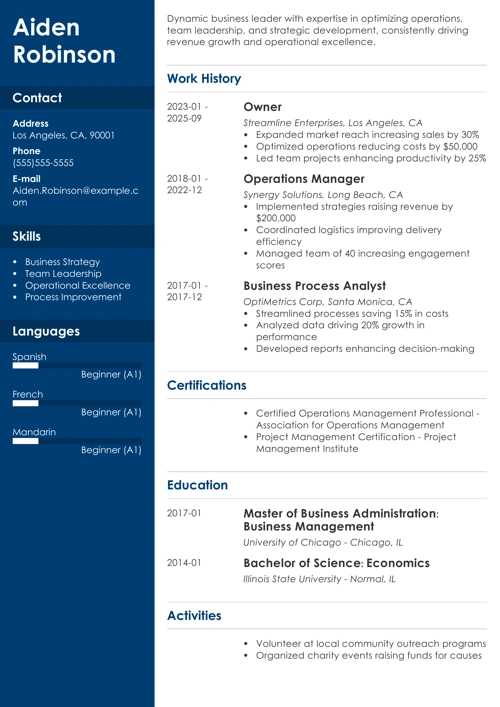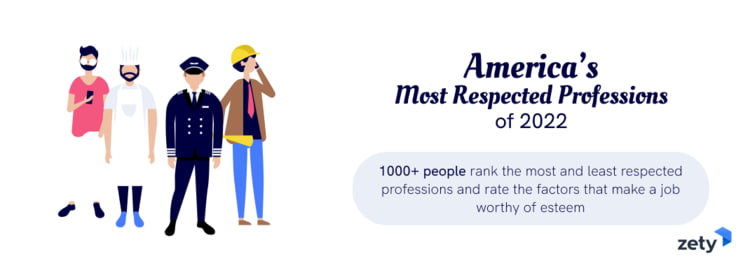
Not all jobs are created equal. And while we often focus on pay and working conditions when assessing careers, there are other considerations too.
One of the biggest has to be respect.
Think about it for a second. How much do you respect nurses and firefighters? How about reality TV stars and newspaper reporters?
Whether your job is held in high esteem isn’t as easy to measure as your paycheck. But it offers fascinating insights into what we value as a society. And it might just help people decide which career to pursue.
So to establish the respect rankings, we’ve analyzed the opinions of 1000+ Americans to see which jobs are held in high regard. But that’s not all, we’ve dug deeper and asked these questions too:
- Which jobs do people respect the least?
- What factors determine whether a career is respectable or not?
- Would people actually want to have the jobs they claim to respect?
Here’s what we found out.
Professional respect rankings 2022
Before we take a look at the final figures, a brief explanation of our method. We presented our respondents with a list of professions.
Then for each job, we asked them to rate their respect for that profession on a five-point scale, from very high respect to very low respect. We randomized the order professions were presented to prevent option order bias.
Then for each job, we added up the percentage of respondents who said they held it in either high or very high respect. So the final figure you see is the overall percentage of respondents who had a positive view of that job in terms of respect.
Now for the results.
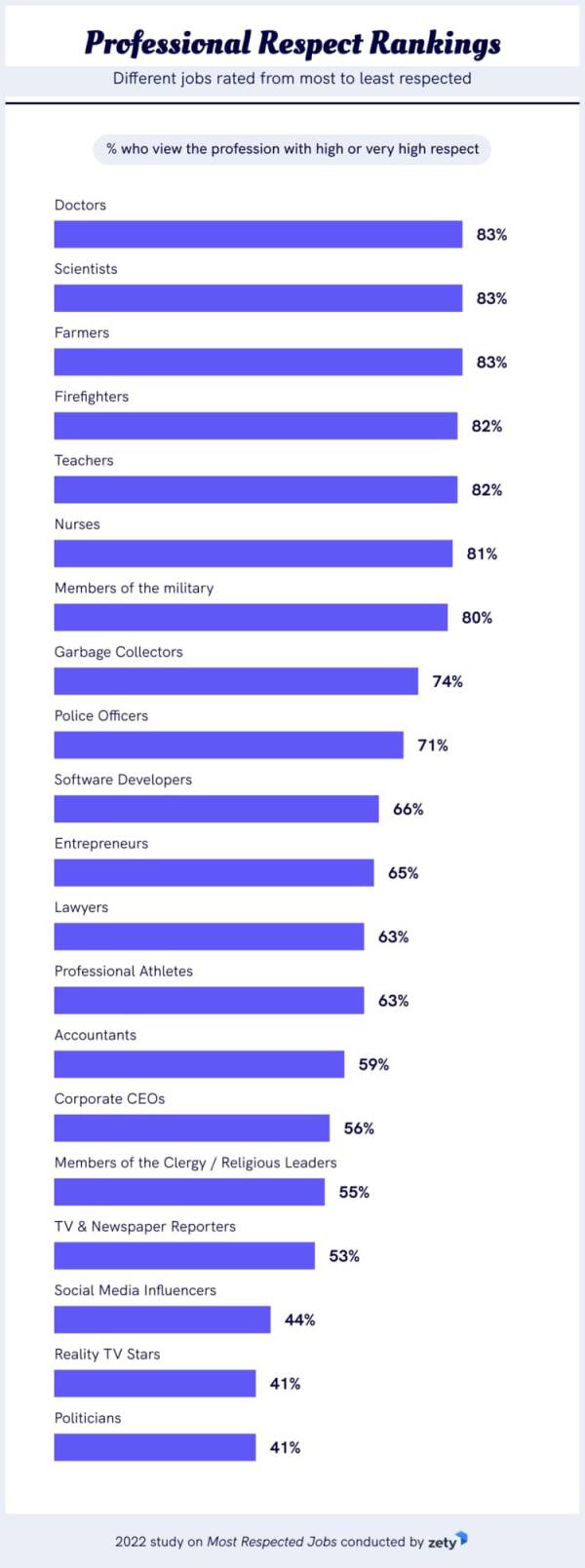
Few would argue with these results, and our joint winners are undoubtedly a sign of the times. Two years into a global pandemic, the tireless efforts of medical professionals and scientists have been a source of hope.
And with supply chain issues affecting us all, it’s no wonder that people recognize the work of farmers in putting food on our tables.
It’s also worth observing that the most respected jobs are a uniting factor across different demographics. The respect for them remained remarkably consistent across gender, age, and educational levels.
In an increasingly polarized society, it seems the jobs we hold in the highest regard are a rare area of unity.
Firefighters and teachers are perennial favorites on lists of professional esteem, as are nurses and members of the military.
Furthermore, the most respected professions stay remarkably consistent across different countries.
A global study by YouGov revealed doctors and scientists top the respect rankings in countries as varied as Australia, Italy, and the United Arab Emirates. It’s enough to make anyone want to don a white coat.
But how about those professions we love to hate? Which unlucky professions languish at the bottom of the respect league?
Social media influencers are barely any more respected, with a 44% positive score. TV and newspaper reporters garnered 53%. And members of the clergy / religious leaders round out the bottom of the barrel.
But here’s where it gets interesting. The least respected professions were more likely to cause divisions of opinion than the most respected. Negative opinions really are divisive ones.
Let’s take politicians first:
- Just 35% of people over the age of 40 gave them a positive respect rating.
- But 50% of under the 40s held them in high regard.
So much for the rebelliousness and healthy disrespect of youth.
And barely 12% of people with no college degree respected politicians compared to 50% of those with a master's degree or higher.
Politicians, take note.
Then there are reality TV stars. People under 40 were 14% more likely to respect them than their older counterparts. No surprises there, as younger people are more accustomed to this modern media “art form.”
But it seems we’ve exploded the myth of reality TV being lowbrow entertainment.
17% of people with no college degree gave them a positive respect score, compared to 51% of those with a master’s degree or higher. Consider that the next time you sneer at someone’s taste in entertainment.
As for the rest of the professions? It was nice to see garbage collectors rank well. A society without sanitation would be an unsightly and unhealthy place to live.
As for lawyers, they did pretty well in our opinion. From Better Call Saul to lawyer jokes, legal professionals get a bad rap, but they still managed a pretty healthy mid-table ranking.
As mentioned previously, there are other studies on which jobs are most respected. But the big question they don’t answer is why.
And that’s what we’re going to look at next.
What makes a job respectable?
So why do we have such a positive view of doctors and scientists, but hold politicians and reality TV stars in contempt?
We considered a number of factors and narrowed it down to a list of nine. Then we presented our respondents with each factor, asking them to rate it in terms of importance. The final score shows the percentage who considered the factor to be somewhat or very important.
Here’s what we discovered.
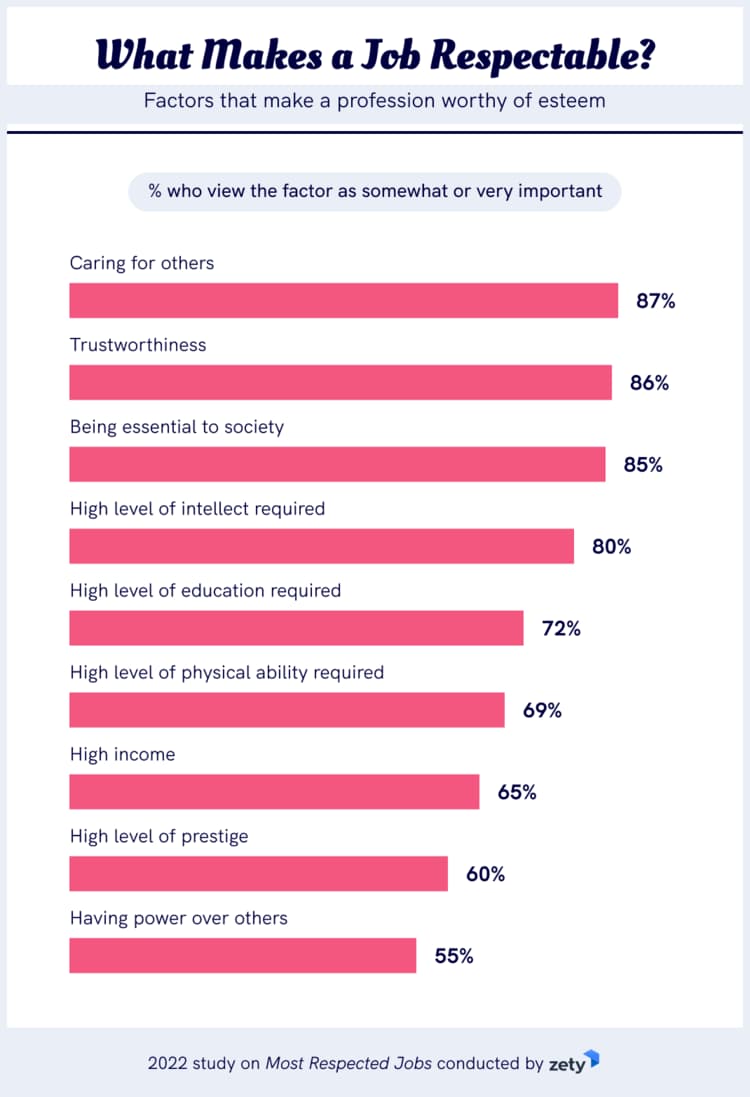
The clear winners were as follows:
- Caring for others
- Trustworthiness
- Being essential to society
Cynics would have us believe that power, income, and prestige are all that counts in today’s world, but these came last.
And it appears that brains win over brawn, with an 11% gap between the importance given to intellect and physical ability.
From a sociological perspective, these findings make perfect sense. Successful societies have to temper self-interest and encourage behavior that’s cooperative. So it’s no wonder that caring for others and being essential to society accords respect.
As for trust and respect, the two go hand-in-hand. Combined they form a fundamental part of positive human relationships.
Once again, the regard for the top factors remained very consistent across different groups. Trustworthiness, caring for others, and being essential to society were considered particularly significant. This held true regardless of age, educational attainment, gender, or political affiliation.
A couple of splits did emerge though. Unsurprisingly, people with higher levels of education themselves had a positive view of having a high level of education.
76% of those with a master’s degree or higher considered it important compared to 59% with no college degree.
What did surprise us though was how views on having power over others changed according to educational status. It seems that higher education brings with it a touch of megalomania.
Only 22% of respondents without a college degree thought that having power over others was an important factor in respecting a job. But that figure almost tripled to 64% of those with a master’s degree or higher.
Here's our take on this. Data from the BLS shows that management positions skew towards those with college degrees. So our respondents without college degrees are more likely to be managed instead of being managers.
That puts them in a position where they’re more likely to have suffered at the hands of bad bosses. Which makes them less likely to place value on having power over others.
And conversely, for those with a higher level of education who are more likely to hold that power, there’s an element of vanity.
So we’ve seen which jobs are respected, and what factors accord them that respect. But does sentiment translate into action? It’s all very well holding a job in high regard, but how about actually doing that job yourself?
Do we want the jobs we respect?
For the final part of our survey, we asked our respondents to put their money where their mouth is. Sure, they might respect doctors, but would they want to be one.
We presented the same list of professions, but this time we asked our respondents if they’d like to have that job themselves. The results you’re about to see show the percentage of survey takers who said they’d somewhat or very much like to be a member of that profession.
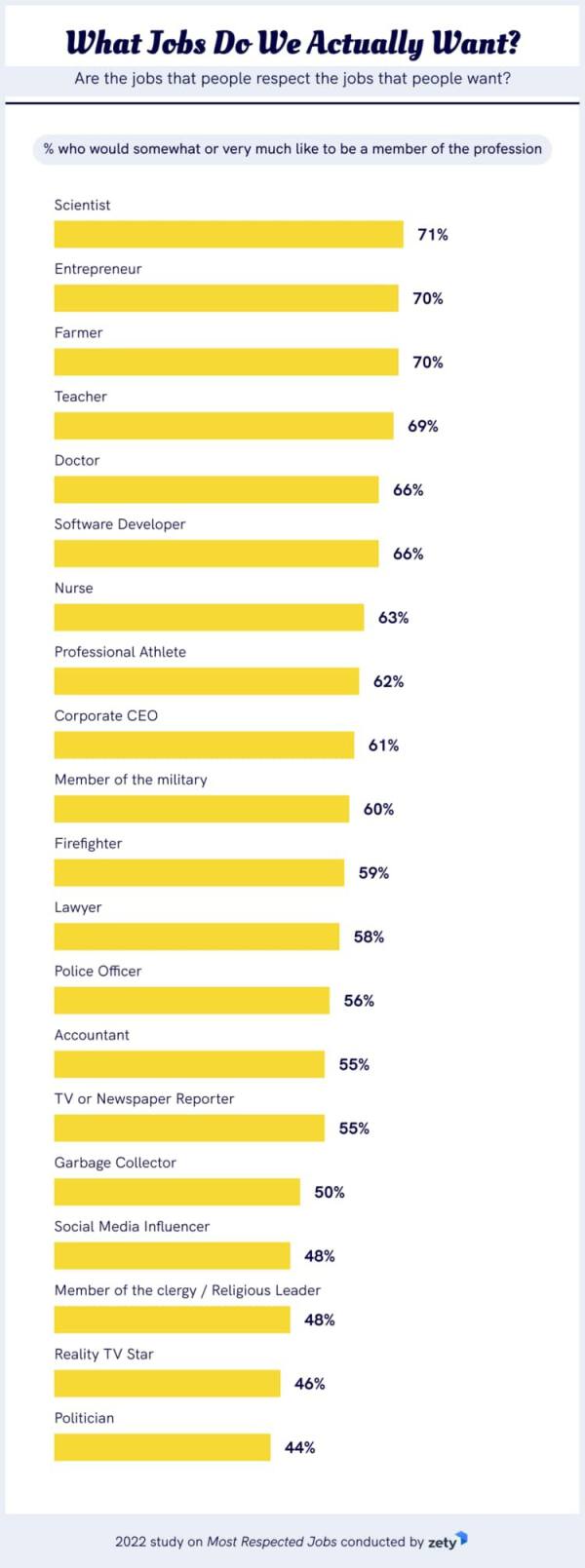
As you can see, there was a real gap between levels of respect and actually wanting to do the job overall. The role of scientist took the number one spot on both ranking lists. But while 83% of respondents respected scientists, 71% wanted to be a scientist.
And just like our rankings for respect, the desire to do the top jobs on the list remained pretty even across the board. But once again, it was the lowest ranking jobs that created the most divisions in opinion.
Only 28% of people with no college degree said they’d like to be a politician. But that figure almost doubled to 54% of those with a master’s degree or higher. Does higher education bring delusions of grandeur? Or maybe it just gives people the sense they have the skills to solve society’s ills.
Then there are reality TV stars. Our results put to bed the stereotype of reality TV being trashy and lightweight. It isn’t people with no college degree who want to be reality TV stars. Just 20% wanted to follow that “career path.”
It’s their well-educated contemporaries who harbor dreams of keeping up with the Kardashians. 52% of folks with a master’s degree or doctorate would take up reality TV as a profession.
Another interesting takeaway was opinions on garbage collectors. They easily ranked in the top half of our respect rankings, but sit near the bottom of the jobs that people actually want.
So it’s all very well to respect the people who clear away of your waste, but when it comes to collecting that trash yourself? Not so much.
And in case you didn’t spot it, politicians took last place in both respect, and willingness to do the job.
Respect wrap-up
Ultimately, some jobs are more respected than others. And the top jobs, along with the top factors for respectability, remain consistent across social groups.
Here’s a reminder of our key findings:
- Doctors, scientists, and farmers are the most respected jobs.
- Reality TV stars and politicians attracted the least respect.
- The top factors that make a job respectable are caring for others, trustworthiness, and being essential to society.
- The most respected jobs and the jobs people would most like to do were a uniting factor across the demographics. But the bottom of the rankings proved divisive, particularly when education levels were taken into account.
And we hope you won’t make assumptions about fans of reality TV in the future.
Methodology
The findings presented were obtained by surveying 1053 American respondents. They were asked questions relating to which jobs they considered most respectable, what factors engender respect, and what jobs they’d like to do themselves. These consisted of a series of scale-based questions relating to levels of respect, importance, and willingness.
Sources
- Bureau of Labor Statistics, “Educational attainment for workers 25 years and older by detailed occupation”
- Dunning, D., Fetchenhauer, and D., Schlösser, T. “The psychology of respect: A case study of how behavioral norms regulate human action.”
- Fiske S., and Dupree C., “Gaining trust as well as respect in communicating to motivated audiences about science topics”
- Huo, Y., and Binning, K., “Why the Psychological Experience of Respect Matters in Group Life: An Integrative Account”
- Smith, M., “Scientists and doctors are the most respected professions worldwide”
- Spagnoletti, C., and Arnold, R., “R-E-S-P-E-C-T: Even More Difficult to Teach than to Define”
- World Economic Forum, “10 most respected professions in the world”
Fair use statement
We’d love you to share our findings. All we ask is that you link back to this page and show our authors the respect they deserve.
About Us
Zety analyzed the best online resume builders to develop a professional resume builder better than the rest. With our expert advice, highlighting your achievements on a resume takes minutes, and our cover letter builder can complete the job application for you.
About Zety’s Editorial Process
This article has been reviewed by our editorial team to make sure it follows Zety's editorial guidelines. We’re committed to sharing our expertise and giving you trustworthy career advice tailored to your needs. High-quality content is what brings over 40 million readers to our site every year. But we don't stop there. Our team conducts original research to understand the job market better, and we pride ourselves on being quoted by top universities and prime media outlets from around the world.


